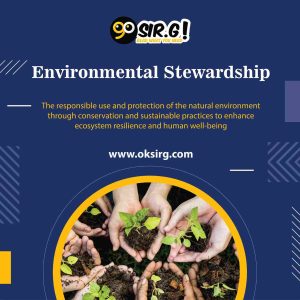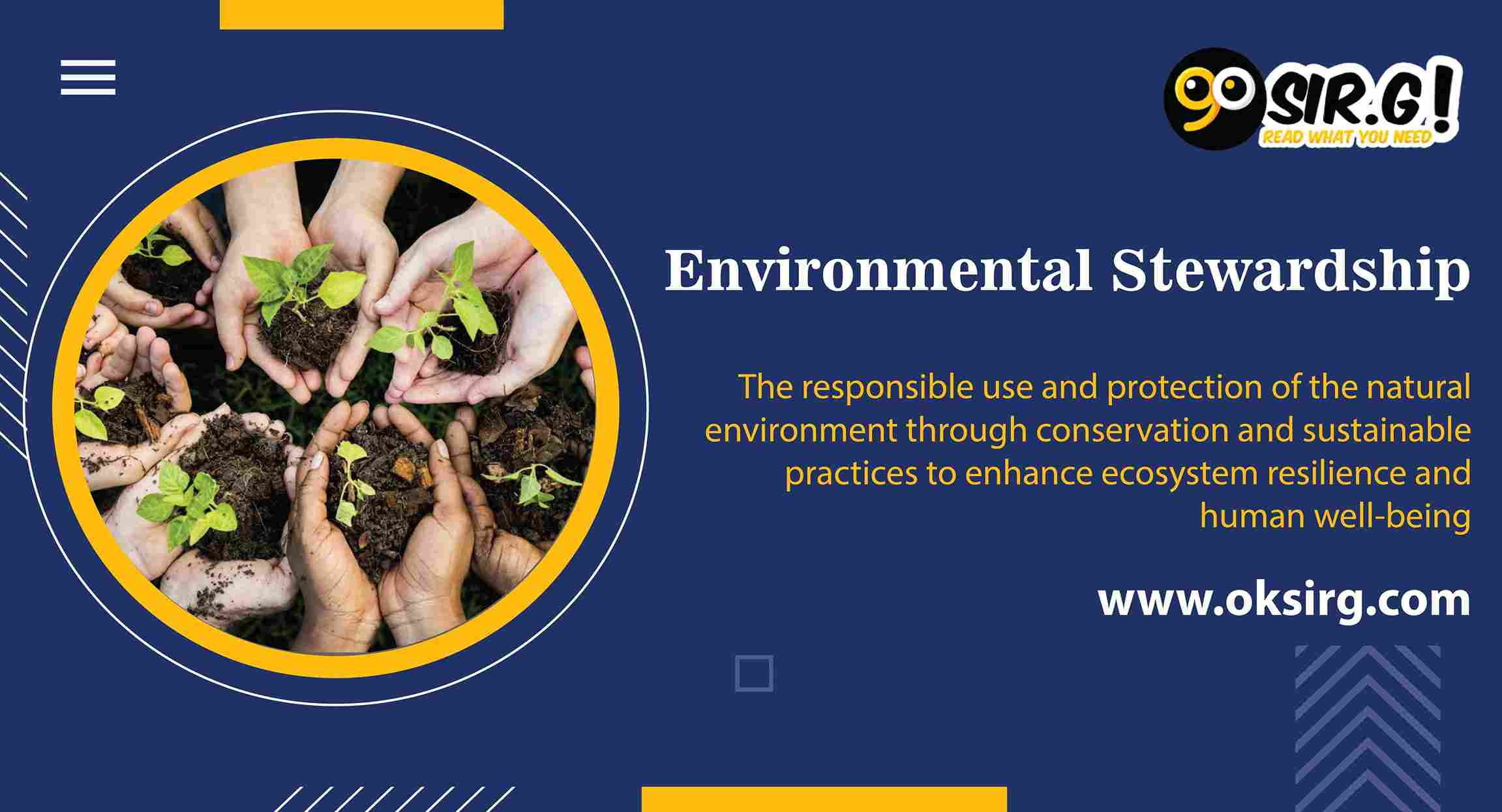Responsible stewardship of the environment is a crucial aspect of promoting sustainable economic development. It requires a delicate balance between fostering economic growth and preserving the environmental integrity of our planet. Moreover, it recognizes the interdependence of the economy and the environment and emphasizes the need for responsible management of natural resources. It minimizes the negative impact of human activities on ecosystems.
By adopting environmental Stewardship principles, companies can pursue economic growth while ensuring our planet’s health and long-term sustainability. These include implementing practices that reduce pollution, conserve resources and protect biodiversity. Moreover, businesses, governments, and individuals must make informed decisions and actions that prioritize environmental protection alongside economic progress.
We can reduce our company’s environmental impact.
These help protect and restore ecosystems and foster innovation, job creation, and long-term economic resilience.
Environmental management requires a concerted effort to promote a harmonious relationship between economic growth and environmental protection. This service means we must recognize the finite nature of our planet’s resources and take proactive measures. It ensures that what we do today does not compromise the well-being of future generations. By adopting this hail, we can create a sustainable and prosperous future that respects. Moreover, Protects the environment while benefiting from economic development.
Renewable Energy and Transitioning to a Low-Carbon Economy:
 Renewable energy and transitioning to a low-carbon economy are critical aspects of global efforts to conflict climate change and reduce emissions Pollutants as the impact of coal on the environment is recognized. Using renewable energy sources as a sustainable alternative is becoming increasingly important. Geothermal power such as solar, wind, hydropower, and geothermal provide clean and abundant sources of energy that do not contribute to carbon emissions or other pollutants. Transitioning to a low-carbon economy requires moving away from dependence on fossil fuels and integrating renewable energy into various sectors. It includes power generation, transport, and industrial processes. Governments, organizations, and individuals worldwide invest in renewable energy infrastructure, research, and development to accelerate this transition. The benefits of the change to a low-carbon economy go beyond environmental sustainability.
Renewable energy and transitioning to a low-carbon economy are critical aspects of global efforts to conflict climate change and reduce emissions Pollutants as the impact of coal on the environment is recognized. Using renewable energy sources as a sustainable alternative is becoming increasingly important. Geothermal power such as solar, wind, hydropower, and geothermal provide clean and abundant sources of energy that do not contribute to carbon emissions or other pollutants. Transitioning to a low-carbon economy requires moving away from dependence on fossil fuels and integrating renewable energy into various sectors. It includes power generation, transport, and industrial processes. Governments, organizations, and individuals worldwide invest in renewable energy infrastructure, research, and development to accelerate this transition. The benefits of the change to a low-carbon economy go beyond environmental sustainability.
In addition, it can boost economic growth, create jobs, increase energy security, and improve public health by reducing air pollution. As geothermal power technologies become more affordable and efficient, they become a viable and competitive option to meet global energy needs. Support measures, regulations, and incentives are implemented at national and international levels to facilitate the transition. These measures have aimed at promoting the use of renewable energy. Moreover, it promotes energy efficiency, reducing the integration of renewable technologies into existing energy systems.
Collaboration between governments, businesses, and communities drives renewable energy adoption. Ensuring a smooth transition to a low-carbon economy. As the world recognizes the urgent need to address climate change, renewable energy and the transition to a low-carbon economy have become key strategies. It reduces pollutants emissions and mitigates the effects of climate change. Using sustainable energy solutions can pave the way for a cleaner and more resilient future for future generations.
Promoting Sustainable Practices in Industries and Businesses:
Promoting sustainable practices across industries and companies is critical to achieving global environmental goals and creating a more sustainable future. By adopting sustainable practices, companies can minimize their negative impact on the environment, conserve resources and contribute to society’s overall well-being. One of the critical aspects of promoting sustainable development in industries and companies is implementing effective resource management. Moreover, these include reducing energy consumption, optimizing water consumption, and reducing waste generation. Moreover, by using energy-saving technologies, companies can reduce their carbon footprint and operating costs. Recycling and waste reduction programs can also help divert waste to landfill and promote a circular economy. Another critical area is the adoption of sustainable supply chain practices. Moreover, This ser includes assessing and minimizing environmental and social impacts along the supply chain, from raw material sourcing to product distribution.
Encouraging suppliers to adhere to sustainable standards and fair trade practices can promote responsible sourcing and ensure social and environmental integrity. In addition, companies can facilitate the design and innovation of sustainable products. This service includes developing products and services that are eco-friendly, durable, and easy to recycle. Moreover, Companies can minimize waste and environmental damage by looking at a product’s entire life cycle, including its manufacture, use, and disposal. Participation in corporate social responsibility initiatives is another way for companies to promote sustainable development. This service can include supporting local communities, investing in renewable energy projects, or contributing to environmental efforts. Furthermore, by demonstrating their bond social and ecological responsibility, companies can improve their reputation, attract environmentally conscious consumers and inspire others to follow their example.
Cooperation and partnerships play a crucial role in promoting sustainable practices:
Businesses can work with government agencies, nonprofit organizations, and industry associations to share best practices, develop sustainable standards, and promote policies that support environmental sustainability. Sharing knowledge and resources can accelerate the adoption of sustainable practices across sectors. In summary, promoting sustainable practices in industries and businesses is crucial to mitigate environmental impacts, conserve resources, and create a more sustainable future. Moreover, by promoting resource efficiency, implementing sustainable supply chain practices, adopting sustainable product designs, adopting corporate social responsibility, and fostering collaboration, companies can play an essential role in transitioning to a more global economy. Sustainable and resilient.
FAQS!
Q: Why is environmental management critical?
A: Protecting the environment is essential because it helps maintain the health and ethics of the planet’s ecosystems. It guarantees the sustainable use of natural resources, protects biodiversity, and mitigates climate change. Promotes a harmonious relationship between people and the environment.
Q: How can people protect the environment?
A: Individuals can take responsibility for the environment in many ways, e.g., B. by reducing their carbon footprint by conserving energy and water, recycling and disposing of waste properly, and supporting sustainable products and local communities. Engaging in environmental protection efforts and championing policies and practices related to the environment.





Leave feedback about this
You must be logged in to post a comment.